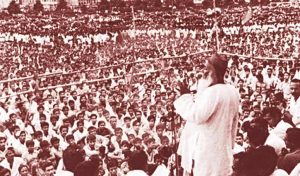Environmentalists at a discussion meeting in the Capital on Saturday alleged that government organisations are least bothered about conserving groundwater, rainwater and water reservoirs, as they are active on water use from underground sources.
They warned that the government will face adverse consequences in providing drinking water in the future if the trend continues.The environmentalists came up with the allegation at a discussion, titled ‘Conserving Water Resource and Environment-Friendly Management’, marking the World Water Day, arranged by Poribesh Bachao Andolon (Poba) at its office in the capital.
Presenting the keynote paper, Poba secretary Dr Moshiur Rahman said water lifting using deep tube-wells for irrigation purpose is very high in Rajshahi, Rangpur and Khulna divisions, resulting in underground water scarcity in the areas and river drying up during the summer.
As the people of the three divisions face water crisis during the summer, the government should provide water to the scarcity-prone areas by conserving rainwater, he suggested.
The Poba secretary also said if the government fails to supply water in the areas, the government efforts to ensure food security for all by 2050 will remain unfulfilled.
Speaking on the occasion, Poba executive general secretary Abdus Sobhan said Bangladesh is in the sixth position in underground water lifting in the world in 2010 as the country lifted 30.21 cubic kilometers of underground water.
He said Bangladesh’s groundwater level is dropping by 1.4 percent every year for the last 30 years (1980-2010) due to excessive lifting, with Rajshahi division being the worst case.
Chaired by Poba executive member Tofail Ahmed, the programme was addressed, among others, by National River Protection Commission member Md Alauddin, Poba secretary Monjur Hasan Dilu and Peace secretary general Efma Hossain. – UNB




